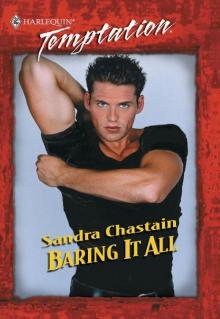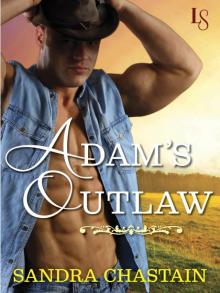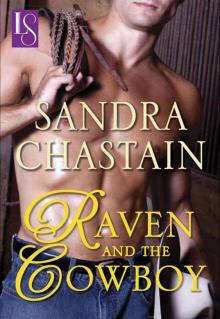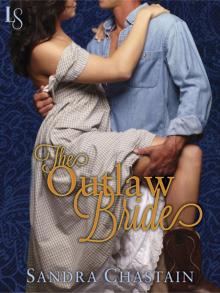- Home
- Sandra Chastain
Raven and the Cowboy: A Loveswept Historical Romance Page 17
Raven and the Cowboy: A Loveswept Historical Romance Read online
Page 17
Tucker had only the markings he’d transferred to the tin plate and Raven’s mother’s carrying bag—that and Luce’s cryptic message, “Follow the water.”
He wished Raven would talk to him.
But she was totally uncommunicative, almost as if she’d turned her back on him. Yank slung his head. Tucker swore. He’d hoped to find a place where they could leave the trail and find another way into the hills. But in the dark, that was a foolish wish. In the end he kept moving up in the same direction he’d traveled that first night. As they climbed higher the trail narrowed, the cliffs became steeper, and the moon disappeared over the summit of the sacred mountains, throwing the trail into complete darkness.
Suddenly Yank came to a determined stop. Tucker couldn’t force him to go any farther. “What in the west side of hell is wrong with you, horse?”
“This is the spot where we go down,” Raven said.
Of course. Tucker was so tired that he hadn’t realized how far they’d come. Yes, they did need to go down, but he couldn’t force himself to urge the horse forward.
It was Onawa who started the descent. Yank whipped his tail and followed. Finally they reached the bottom and stopped to allow the horses to drink from the Rio Grande.
Tucker felt a curious sense of déjà vu. He’d done this before. The last time, they’d found Luce beneath the ledge, hidden in the rocks. Tonight the ghosts of both Luce and the murdered Mexicans seemed to dance down the canyon. Tucker shivered and studied the cliffs. He didn’t think that Swift Hand’s or Porfiro’s men were watching, but something, or someone, was.
“I don’t think we’d better risk climbing up the other side in the darkness,” he said.
Raven waited.
“We’ll take cover for the rest of the night in the place where we found Luce.”
As if she understood, Onawa moved down the canyon.
“I think,” Tucker went on, “we have a good enough start that we can take a brief rest. Then if we leave at first light we can get back to the cabin before anybody learns we are missing.”
“All right.” Raven slid from her horse and hobbled her nearby. She then moved toward a patch of grass down-river and, with a knife she’d taken from her pack, cut huge hunks of the tender vegetation to feed the horses.
In the meantime Tucker removed their bedrolls and unfolded them side by side beneath the overhang. He filled his canteen, noting that Raven hadn’t opened hers at all. By the time Raven returned, he’d made a cold camp and was waiting for her to bed down.
She didn’t argue with his arrangements, rather it was as if she no longer cared. Moments later she was covered with her blanket and her breathing signaled that she’d already fallen into a light sleep.
Tucker felt a great disappointment. He didn’t know what he’d expected, certainly not a request for a good night kiss as she’d made before. Not a gesture of remorse for her drawing away. Not the passionate woman he’d rejected back in her room. But he’d hoped for some sign that she remembered and that she, too, felt regret.
There was none.
For a long time, Tucker sat in the darkness, his head resting on his saddle, his hand on the holster beside him. Then, finally, as faint streaks of light swirled the sky, he slept.
Beyond his reach Raven lay, restless in that last sleep which brings the phantoms, the unknown messengers of the dark. She felt her body itching as if she’d stepped in a bed of fire ants. But it was more than that. There was an urgency, almost a fear. She had to hurry.
There was someplace she had to go, and she was being held back. There was no one there, but she couldn’t move. Struggle as she might, she could not rise from her bed. Beyond the faint haze of darkness she could see them, the phantoms, writhing, beckoning.
“Please,” she whispered urgently, under her breath. “Let me go. I must go.”
Yes, you must go. But not alone. You must complete the ritual. Follow the stream to the top. Together you will find the cave in the mountain. Heed my words and look for the sign. Beware the bronze dagger.
Raven came suddenly awake. She’d hoped for a reassuring dream, for another meeting between the raven and the cougar, for a message that told her where to go. But this suggestion of a cave was not reassuring. There were phantom figures beyond her hiding place. They weren’t Mexican bandits and certainly not part of Swift Hand’s band.
The figures in her dream had been bearded, their chests covered with gold and silver, their heads protected with odd helmets that caught the moonlight. She’d never seen people dressed like that. Were they gods?
Raven’s heart was beating wildly. She sat up, afraid, alone.
Alone? She could see Tucker lying next to her, but she couldn’t reach him. He was restless, moving about in his sleep. And then it came, suddenly and powerfully, the chanting, the low, distant drumbeats that announced a vision. But this time it was different.
Suddenly she could see through Tucker’s eyes, feel the intensity of his thoughts and understand his fear.
He was not here. He was in a different place, a different time. There was a battle raging about him. Indians, crying, screaming in fear. Children afraid—alone. And there were soldiers, wearing blue uniforms, riding toward the camp. Pistols were drawn, rifles firing.
“No, stop,” someone cried.
“We are only women and children,” another called out.
“We have come here in peace,” an old man pleaded.
But still the soldiers came, relentlessly, stabbing, shooting, mutilating. Like waves of locusts devouring everything in their wake, they came.
And people died.
Then she saw him, Tucker, bearing down on a child, sword drawn, eyes wide with horror. At the last moment, he picked up the little girl, and holding her beneath his arm, he rode away. And Raven became that child, felt her terror, felt her fear. Wildly Tucker urged the big black horse whose name she now knew to be Yank through the camp, across the shallow river, and into the hills beyond.
She could feel the big man’s heart beating, his fear, the saliva dried in his mouth and how he could barely swallow. Finally, when they were far away from the battle, he let the child down, looking at her with great sad eyes.
“I can no longer do this,” he said. “I renounce all of this and the life I have lived. From now on, I travel alone.”
The little girl looked up at the golden man who had saved her. Wise beyond her years, she knew that he was as empty as she.
“You must not go back to the camp now, little one. Wait here. Someone will find you.” And he rode away, leaving the child behind.
The little girl looked around, then started back the way they’d come. Raven, now flying above and watching her, whispered, “No, don’t go.”
But she went, putting one foot before the other until she was so tired that she could barely walk. Finally she topped the rise and looked down at the scene before her. The tepees had been burned. The smoke was thick, but she could see the bodies strewn across the camp like thistle blown by the wind. There was a smell of blood and fire, but there was no sound, only a great silence.
The little girl looked at the devastation and began to cry.
Overhead, Raven flew low across the site of the massacre, searching for one to care for the child. Then she heard a single shot. As she dipped her wings and reversed her course, she saw the child fall, mortally wounded. The soldier would never know that his heroism had all been for nothing. Twice she flew over the camp, then soared across the horizon until she saw him, the fleeing man on the black horse. She accompanied him as he rode for most of the day, then stopped by a stream and bathed the splatters of blood from his body. He made a fire and burned the blue uniform. When the last coal had died away, he put on civilian clothes, mounted his horse once more and started south.
From above the site, high on a ledge, a mountain lion leapt down and started toward the rider. Now all four, the cougar, the raven, and the dreamers, were one.
Tucker jerked and opened his e
yes, finding the dark-eyed woman watching him. The eyes in his dream, the symbol of the future, the spirit child of his vision. She’d come to him again in the flesh.
Raven.
14
“Tell me what happened.”
“It was only a dream,” he answered, still caught up in the horror.
“I know. I shared the dream with you.”
“I don’t understand. How can that be?”
“I cannot say. Perhaps the spirits willed it, Tucker.”
“Then you know what I did?”
“I know you were one of the soldiers and you rode away from the battle.”
The confusion almost overwhelmed him. “Yes. I couldn’t do it.”
“Couldn’t do what?”
He used every mental control he possessed to force himself to examine logically what he’d just experienced and answer her. “Kill people. First I was a Confederate soldier, too young to know what would happen in war. I did what I was ordered to do. Toward the end, wounded and sick of killing, I couldn’t find the glory anymore. I went home and found out that the war had cost me my land and everyone I cared about. I just turned my sights to the west and kept riding. It didn’t matter much what I did. Ended up in Colorado.”
“What were you going to do out here?”
“I didn’t know. Being a soldier was all I’d ever done, except live on a plantation where my father made all the decisions.”
“What happened to your father?”
“He was killed in the first year of the war, before I even joined up with my fellow rebels.”
“But you became a soldier again out here.”
“Yes, I crossed paths with Colonel John Chivington. He was organizing the Third Colorado Cavalry, a new regiment of volunteers who’d been ordered to purge the savage Indians.”
“And you joined.”
“That was my last mistake. I had some crazy idea that if the West were rid of the savages, others like me could come here and start over. I needed to believe in a new future. I didn’t know it meant getting drunk and killing innocent women and children.”
Raven nodded, a sad expression on her face. “You weren’t the only good man caught up in the persecution of Indians. Many of the soldiers had to get drunk to do it, even the bloodthirsty ones.”
“No amount of whiskey could make me slaughter innocent people—or worse.”
“Chivington,” Raven said. “The Sand Creek Massacre. They attacked Black Kettle and his Cheyenne who’d made camp on the creek. You were there.”
“I was there.”
“But you didn’t kill. I saw you. You saved a child, a child that could have been me.”
Then, finally, he understood. She really had been there. Through his dream she’d seen what had happened. She knew the truth.
And she hadn’t turned away.
Raven took his hand, not censuring him, but simply sharing the pain of his memory.
Tucker sat up, careful not to move his arm, but forcing himself leave to the dream behind. He let out a deep sigh. He was so tired. When he dreamed about the past, it seemed to suck the very life out of him, leaving him drained of emotion.
Yet this time was different. Raven’s touch was a kind of balm, an anchor. Finally he acknowledged the connection between them. Not sensual this time, but spiritual and just as powerful. Everything about her touched him in some way. And every day brought a different woman to his side. The determined warrior at first had turned into the mystical spirit woman who changed into a passionate creature discovering how to be a woman. Now came the compassionate healer who made him bare his soul.
Tucker relaxed. It had been a long time since he’d been sure he had a soul. Because of Raven, it had sprung to life again. He didn’t know what he thought about that. Life was easier when he could just drift without thought or responsibility. But was that really living?
Raven could feel Tucker’s tension fall away. She was aware, even if he wasn’t, of the importance of this moment. He had accepted that the spirits could influence their lives, and he was sharing himself with her, willingly, knowing that it was not a past he could be proud of. This understanding signified nothing in the larger picture. It didn’t mean that they would find the treasure. But it was important to her as a woman, just the same.
“Don’t you see, Tucker? All the bad things that happened are in the past. We can’t change that. But we have an opportunity to change the future. We will find the treasure, buy land, and look toward a better life.”
He gave a dry laugh. “I’ve heard that before. Every commander since Moses has believed that he had some kind of divine guidance. I always thought it was a lie, Raven, that the only thing a man can know and control is what’s inside himself. I’m what I am. You’re what you are. The best we can hope is that I don’t ruin you. Now, let’s get moving.”
As they mounted their horses, Raven felt a great sorrow in her heart for this man who’d lost his belief in the future. For a moment he’d shared his pain, and she’d learned that he was more of a crusader than he knew. Somewhere deep inside of Tucker Farrell was that promise of tomorrow that he’d spurned. He just needed help in finding it. She smiled at the thought of helping Tucker, convinced that, even more than before, their futures seemed entwined.
By the time the sun hit the floor of the canyon, they were almost back to Luce’s cabin. The trip was easier this time, for they’d made it before.
As they rode, Tucker’s spirits began to rise. He’d worry about the spirit world later. For now, he would concentrate on seeking the treasure, though he had no grand illusions that they would find it. And even if they did, they would never be able to get it out and take it back to Colorado. To succeed, they would have to face bandits and Indians, not to mention others who would hear about the discovery.
No, the treasure hunt would be a grand adventure, but the chances of his being able to buy land in Oregon after this was over were about as good as his chances of marrying Raven and making her the mother of his children.
Marrying Raven? Where had that come from? The only time in his life that Tucker had entertained the idea of marriage was when he was eighteen years old and going off to war. Having Lucinda pledge her undying love and promise to wait for him was part of the grand spirit of patriotism that swept the South. It had been an illusion. Learning that she’d already taken up with someone else when he returned hadn’t even disturbed him.
She’d been part of a dream that had died, and he hadn’t allowed himself to dream again. He’d deliberately closed off all thoughts of marriage, a family, the good things that might have been. Every day had been a new day, a new start. That was the way he had wanted it.
Until now.
Until Raven had invaded his dreams and his life. Now he had difficulty telling what was real and what was part of the spirit world she carried around with her. And, in spite of his skepticism, he kept running head-on into some kind of magic that deepened the connection between them.
He couldn’t believe that he’d shared what had happened at Sand Creek, but he had. And she hadn’t been horrified to learn that he was one of the soldiers who’d attacked the Indians who’d wanted only peace.
He felt dirty and ashamed about that part of his past. Now Raven made him feel strong and proud. Seeing himself through her eyes was hard to believe.
For the last five days, they’d ridden over half these mountains, being chased and being captured. Now they’d come full circle, back to where they’d started, as if they couldn’t escape their destiny.
When they reached Luce’s cabin, Tucker slid off Yank and removed his saddle and bridle. “We’ll rest the horses and eat. I want to retrace our steps and see if we’re being followed.” He led the big black horse into the makeshift corral. He turned back to Raven, catching her just as she slid from Onawa.
“Careful, that ankle isn’t back to full strength yet. We’re going to need all our parts working to get through this.”
“It’s much better.”
Raven caught Tucker’s shoulders and held him for a moment. “Tucker, will you do something for me?”
“Sure, what?”
“Until we find the treasure, can we get past whatever there is between us and just be friends, really friends? I’ve never been around a man alone, other than my father and my grandfather, and I’m not sure what I’m supposed to feel. And, like you, I fear this emotion could interfere with what we have to do. But for now, we must make a truce between us.”
“A truce? Sure, and you and I will ride through the streets of Washington City leading a parade when we’re done here. Maybe I’ll even run for political office. A deserter and a do-gooding Indian, won’t we be a pair?”
“I think we would make a grand pair,” Raven whispered and watched him head up the trail on foot. “I think we were meant to be. Some things even Grandfather did not prepare me for, but I will learn.”
Raven was very confused. Sometimes Tucker seemed to be deliberately cruel. She wished she knew more about being a woman. At the same time, a wave of guilt swept over her that she was even thinking about herself when she should be focusing all her attention on her mission.
“Oh, Grandfather, why couldn’t you have come with me? I’m so uncertain.”
You were chosen, Raven. The future is in your hands. Do not despair. The spirits will lead you in the way you are to go.
She’d heard that from her mother’s people for most of her life, and she’d accepted it. Surely the Great Spirit hadn’t intended the Arapaho people to be eliminated from the face of the earth. But that was what was happening. Their lands had been taken. The buffalo were being severely depleted, and now their own tribal numbers had dwindled to a pitiful few. How was she to change all this?
With a heavy heart, she turned toward the cabin, where she found a bucket to haul water for the horses. Then she brushed them down for the night. After unpacking their bedrolls, she built a fire to prepare a meal, and set a pot of water to boil for coffee. She cut chunks of salt pork and fried it in a skillet over the fire. Next she mixed up flour and grease and salt to make biscuits. Tomorrow she’d search for greens and perhaps a few spring berries, but tonight they’d fill their stomachs with pork and bread.

 The Redhead and the Preacher: A Loveswept Historical Romance
The Redhead and the Preacher: A Loveswept Historical Romance Baring It All (Mills & Boon Temptation)
Baring It All (Mills & Boon Temptation) Adam’s Outlaw
Adam’s Outlaw Mac's Angels: The Last Dance: A Loveswept Classic Romance
Mac's Angels: The Last Dance: A Loveswept Classic Romance Imaginary Lover
Imaginary Lover The Judge and the Gypsy
The Judge and the Gypsy Silver Bracelets: A Loveswept Contemporary Classic Romance
Silver Bracelets: A Loveswept Contemporary Classic Romance Penthouse Suite
Penthouse Suite Lean Mean Loving Machine: A Loveswept Classic Romance
Lean Mean Loving Machine: A Loveswept Classic Romance Joker's Wild
Joker's Wild Raven and the Cowboy: A Loveswept Historical Romance
Raven and the Cowboy: A Loveswept Historical Romance Night Dreams
Night Dreams The Outlaw Bride
The Outlaw Bride Scarlet Butterfly
Scarlet Butterfly Mac's Angels
Mac's Angels Run Wild With Me
Run Wild With Me Lean Mean Loving Machine
Lean Mean Loving Machine